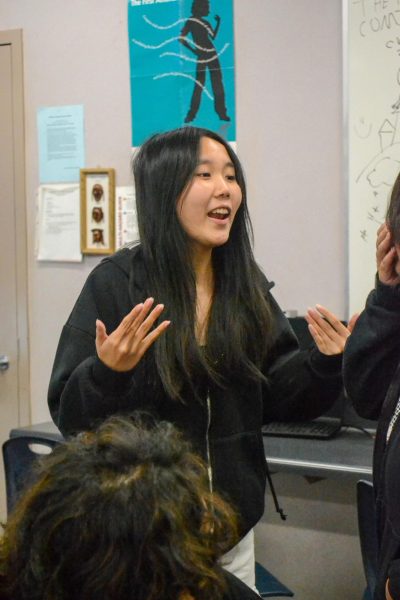“When am I ever going to use this in real life?”
It is often difficult to understand how the quadratic formula, the anatomy of a cell or the timeline of the American Revolution can be helpful in our futures. The AP WE Service Project aims to answer this question by helping students apply topics from their AP classes to their daily lives and ultimately make an impact on society.
The project, instituted by teacher Nicole Midani in AP Chemistry, focuses on cross-disciplinary research across the fields of green chemistry and environmental justice. Students were required to plan the project during the first semester, then execute it in the second. After completing the project, the student’s proposal and outcomes are shared with the College Board where they can be evaluated and added to the student’s AP transcripts to be seen by universities.
“It’s super important to have students out and about, tackling one of the biggest problems of their generation, which is global climate change,” Midani said. “And if they can be out serving their community and using what they’re learning in their AP classes, then I can see no bigger privilege as a teacher and no better way to support my students.”
The AP WE Service Project was pioneered in 2016 and first introduced to Northwood in 2019 in AP Computer Science classes taught by Midani and math teacher Ibeth Jaime-Ortiz, where students worked to develop solutions for accessible healthcare.
Although resources are sponsored by the WE foundation and College Board, many teachers still choose to not implement this new system into their classrooms. AP course curriculums are overloaded with an abundance of information that must be taught in short periods of time and often do not account for the additional time necessary to execute a project.
“Application based learning is important, but I don’t think it is realistic for a lot of the AP curriculum,” AP Art History teacher Zane Pang said. “If College Board changed their expectations for the class and the format of it, then I think it would be a really cool thing to do.”
While the service project adds more work to the busy schedules of AP students, many see the benefits of participating in application-based learning.
“Practicing project based learning is really important, especially for chemistry since global warming is one of the biggest issues of our time,” junior Zane Commissariat said. “Being able to research and then be exposed to communities and help them with what we learn will probably be important for college and just life after that.”
Even though the AP WE Service Project is still in its beginning stages, those who have adopted it into their curriculum believe that it is a changing point for education. The project steers students towards research, service and academic exploration and away from a traditional school curriculum, giving learning a purpose and fostering a progressive educational environment.
“I care deeply about service learning and one of my biggest goals as an educator is to support students in becoming conscientious and critical servant leaders in their communities,” Midani said. “Encouraging students to take everything that they produce in my class and make change for the better in this world really just gives a bigger purpose to what I do.”





















































